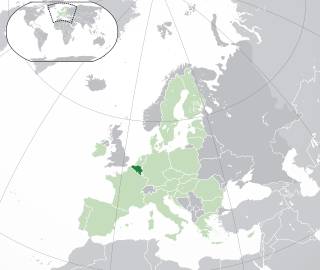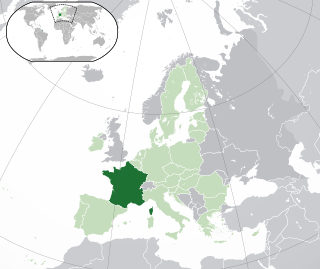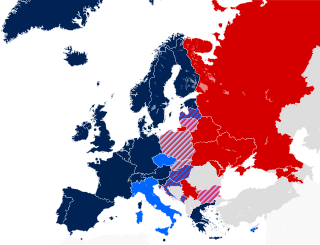
A civil union is a legally recognized arrangement similar to marriage, created primarily as a mean to provide recognition in law for same-sex couples. Civil unions grant some or all of the rights of marriage.
Same-sex marriage has been legal in Belgium since 1 June 2003. A bill for the legalization of same-sex marriages was passed by the Senate on 28 November 2002, and by the Chamber of Representatives on 30 January 2003. King Albert II granted his assent, and the bill entered into force on 1 June. Polling indicates that a significant majority of Belgians support the legal recognition of same-sex marriage. Belgium was the second country in the world to legalise same-sex marriage, after the Netherlands.
Same-sex adoption is the adoption of children or adults by same-sex couples. It may take the form of a joint adoption by the couple, or of the adoption by one partner of the other's biological child or adult.
Same-sex marriage has been legal in France since 18 May 2013, making France the thirteenth country in the world and the ninth in Europe to allow same-sex couples to marry. The legislation applies to metropolitan France as well as to all French overseas departments and territories. Polling suggests that a significant majority of French people support the legal recognition of same-sex marriage.

Same-sex marriage has been legal in New Brunswick since June 23, 2005 in accordance with a ruling from the Court of Queen's Bench of New Brunswick. This decision followed similar cases in eight other provinces and territories, and pre-dated by only one month the federal Civil Marriage Act of 2005, which legalised same-sex marriage throughout Canada. New Brunswick was the ninth jurisdiction in Canada and the twelfth in the world to recognise same-sex marriage.
Same-sex marriage has been legal in Switzerland since 1 July 2022. Legislation to open marriage to same-sex couples passed the Swiss Parliament in December 2020. The law was challenged in a referendum on 26 September 2021 by opponents of same-sex marriage and was approved with the support of 64% of voters and a majority in all 26 cantons. The law went into force on 1 July 2022. A provision of the law permitting same-sex marriages performed abroad to be recognised in Switzerland took effect on 1 January 2022. Switzerland was the seventeenth country in Europe and the 30th in the world to allow same-sex couples to marry.
Same-sex marriage has been legal in Greece since 16 February 2024. In July 2023, Prime Minister Kyriakos Mitsotakis, head of the re-elected New Democracy party, announced his government's intention to legalise same-sex marriage. Its legalisation was part of an action plan for LGBT equality, which was drafted by a special committee appointed by Mitsotakis in 2021. Legislation was introduced to the Hellenic Parliament on 1 February 2024 and passed on 15 February by 176 votes to 76. The bill was signed into law by President Katerina Sakellaropoulou and took effect upon publication in the Government Gazette on 16 February. Polling suggests that a majority of Greeks support the legal recognition of same-sex marriage. Greece was the 16th member state of the European Union, the 21st country in Europe, and the 36th in the world to allow same-sex couples to marry.
Same-sex marriage has been legal in Luxembourg since 1 January 2015. A bill for the legalisation of same-sex marriages was enacted by the Chamber of Deputies on 18 June 2014 and signed into law by Grand Duke Henri on 4 July. Polling suggests that a majority of Luxembourgers support the legal recognition of same-sex marriage. Luxembourg was the last Benelux country, the tenth in Europe and the sixteenth in the world to allow same-sex couples to marry nationwide.
Italy has recognised civil unions since 5 June 2016, providing same-sex couples with most of the legal protections, benefits and rights of marriage. A bill to this effect was approved by the Senate on 25 February 2016 and by the Chamber of Deputies on 11 May. It was signed into law by President Sergio Mattarella on 20 May, published in the Gazzetta Ufficiale the next day and took effect on 5 June 2016. The law does not grant same-sex couples joint adoption rights or access to in vitro fertilisation. Before this, several regions had supported a national law on civil unions and some municipalities passed laws providing for civil unions, though the rights conferred by these unions varied from place to place.

Lesbian, gay, bisexual, transgender, and queer (LGBTQ) rights in Belgium are regarded as some of the most progressive in Europe and the world. In 2023, ILGA-Europe ranked Belgium as second in the European Union for LGBT rights protection, behind Malta. In 2024, ILGA-Europe ranked Belgium the third highest after Malta and Iceland.

Lesbian, gay, bisexual, transgender, and queer (LGBTQ) rights in France are some of the most progressive by world standards. Although same-sex sexual activity was a capital crime that often resulted in the death penalty during the Ancien Régime, all sodomy laws were repealed in 1791 during the French Revolution. However, a lesser-known indecent exposure law that often targeted LGBTQ people was introduced in 1960, before being repealed in 1980.

Lesbian, gay, bisexual, transgender, and queer (LGBTQ) people in Luxembourg have the same legal rights as non-LGBTQ people. Partnerships, which grant many of the benefits of marriage, have been recognised since 2004. In June 2014, the Luxembourgish Parliament passed a law enabling same-sex marriage and adoption rights, which took effect on 1 January 2015. Additionally, discrimination on the basis of sexual orientation and "change of sex" in employment, healthcare and the provision of goods and services is outlawed, and transgender people are allowed to change their legal gender on the basis of self-determination.

Lesbian, gay, bisexual, and transgender (LGBT) people in Monaco may face legal challenges not experienced by non-LGBTQ residents. Both male and female types of same-sex sexual activity are legal in Monaco. However, same-sex couples and households headed by same-sex couples are not eligible for the same legal protections available to opposite-sex married couples. Monaco is the least developed among Western European countries in terms of LGBT equality.

Lesbian, gay, bisexual, transgender, and queer (LGBTQ) rights in Switzerland are some of the most progressive by world standards. Social attitudes and the legal situation have liberalised at an increasing pace since the 1940s, in parallel to the situation in Europe and the Western world more generally. Legislation providing for same-sex marriage, same-sex adoption, and IVF access was accepted by 64% of voters in a referendum on 26 September 2021, and entered into force on 1 July 2022.

Lesbian, gay, bisexual, transgender, and queer (LGBTQ) rights are widely diverse in Europe per country. 22 of the 38 countries that have legalised same-sex marriage worldwide are situated in Europe. A further 11 European countries have legalised civil unions or other forms of recognition for same-sex couples.

Debate has occurred throughout Europe over proposals to legalise same-sex marriage as well as same-sex civil unions. Currently 33 of the 50 countries and the 8 dependent territories in Europe recognise some type of same-sex union, among them most members of the European Union (24/27). Nearly 43% of the European population lives in jurisdictions where same-sex marriage is legal.
Slovakia does not recognise same-sex marriage or civil unions. However, there is some limited legal recognition for unregistered cohabiting same-sex couples, notably with regard to inheritance rights. The Constitution of Slovakia has limited marriage to opposite-sex couples since 2014, and bills to allow same-sex civil partnerships have been introduced several times, most recently in 2023, but all have been rejected.

The law opening marriage to same-sex couples, no. 2013-404 is a French law which, since 18 May 2013, grants same-sex couples the right to marry and jointly adopt children.
Nicole Manzone-Saquet is a Monegasque politician and a president of the Union of Monegasque Women. From 2008 until 2013 Manzone-Saquet was a member of the National Council of Monaco from Union Monegasque.

The Syndicat de la famille, better known under its original name of La Manif pour tous (LMPT), is a nonprofit organization and political movement based in France which is responsible for most of the anti-gender and anti-LGBT demonstrations and actions that took place between 2012 and 2013, in opposition to the legalization of same-sex marriage in France, as well as against the adoption of children by same-sex couples in France.











